25 May 2022 –
The UNCAC Coalition’s sixth regional meeting of the Asia-Pacific network took place on the 11th May 2022, featuring discussions on corruption in the extractive industry including concerns for human rights and the environment. The meeting gathered 19 participants including representatives from all over the region, Asia-Pacific members of the Coalition Coordination Committee (CCC), and colleagues from the Coalition’s Vienna Hub. Three affiliated groups from the Asia-Pacific region from Thailand, Australia and Philippines, as well as an anti-corruption expert from the Sub-Saharan African region gave presentations on issues related to corruption in the extractive industries followed by a lively discussion and information exchange on queries, ideas, and activities.
Regional Coordinator for Asia-Pacific, Fatema Afroz, opened the meeting. Before setting the scene for presentations on the main agenda item, she presented the key findings of the Annual Activity Survey 2022 from the Asia-Pacific region, giving details about the priorities of the region’s members.
Key Findings of the Annual Activity Survey 2022
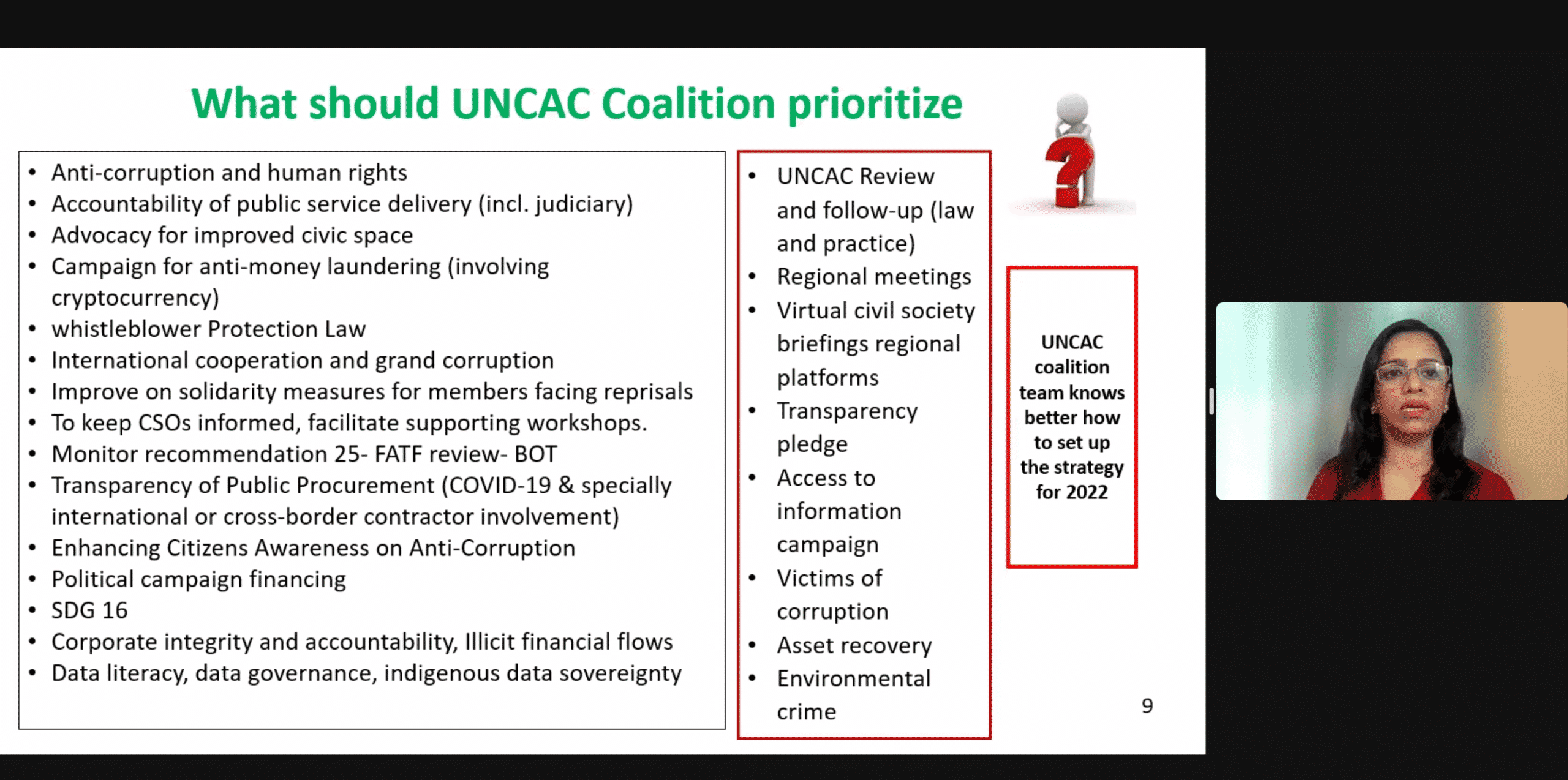
The Annual Activity Survey 2022 was carried out among the members and affiliated groups of the UNCAC Coalition. In the Asia-Pacific region, it was found that the main policy areas CSOs are working in include: corruption, money laundering and foreign bribery issues (22% of respondents), governance, rule of law and human rights (16%), political integrity (15%), access to information, transparency and digital information (9%), financial integrity and public procurement (7%), development, poverty, conflict transformation, and peace building (7%). The survey also found some specific challenges that our regional members faced, including lack of funding, shrinking civic space, complex bureaucracy or lack of political will, and declining democracies. The respondents of the survey are eager to continue receiving updates from the Coalition, and strengthen engagement on follow-up actions, UNCAC reviews, experience sharing events and activities, and capacity-building workshops.
Gold Mining in Thailand: Impact on the Phichit people
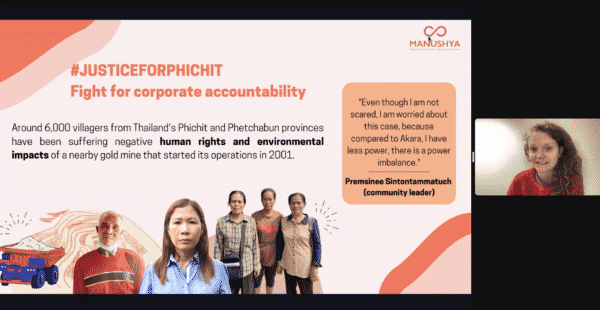
Andrea Spakova from the Manushya Foundation presented the case study of Phichit, a village in Thailand, where gold mining operations by foreign companies are exerting a negative impact on the villagers. The impact ranges from loss of arable land, groundwater pollution, soil pollution with heavy metals and toxic chemicals such as cyanide, arsenic and manganese, to various other health hazards. The villagers did not receive any compensation for the loss of their livelihoods and their natural environment has never been restored. Issues with a lack of transparency and accountability, irregularities regarding licensing matters, and harassing protesting villagers through illegal arrests were further grievances of the uncompensated villagers.
However, in light of of a massive outcry by CSOs, some attempts were made, including closures in gold mining. With the rise of the COVID-19 pandemic, emergency decrees awarded new mining licenses, generating fear among the villagers that the old pandora’s box would be reopened. The Manushya Foundation continues to campaign through social media and by providing grants to the community to cover legal expenses related to their class action lawsuit, as well as facilitating capacity building trainings.
Philippines: Mining and Corruption in the Philippines – Pushing Communities to Greater Poverty
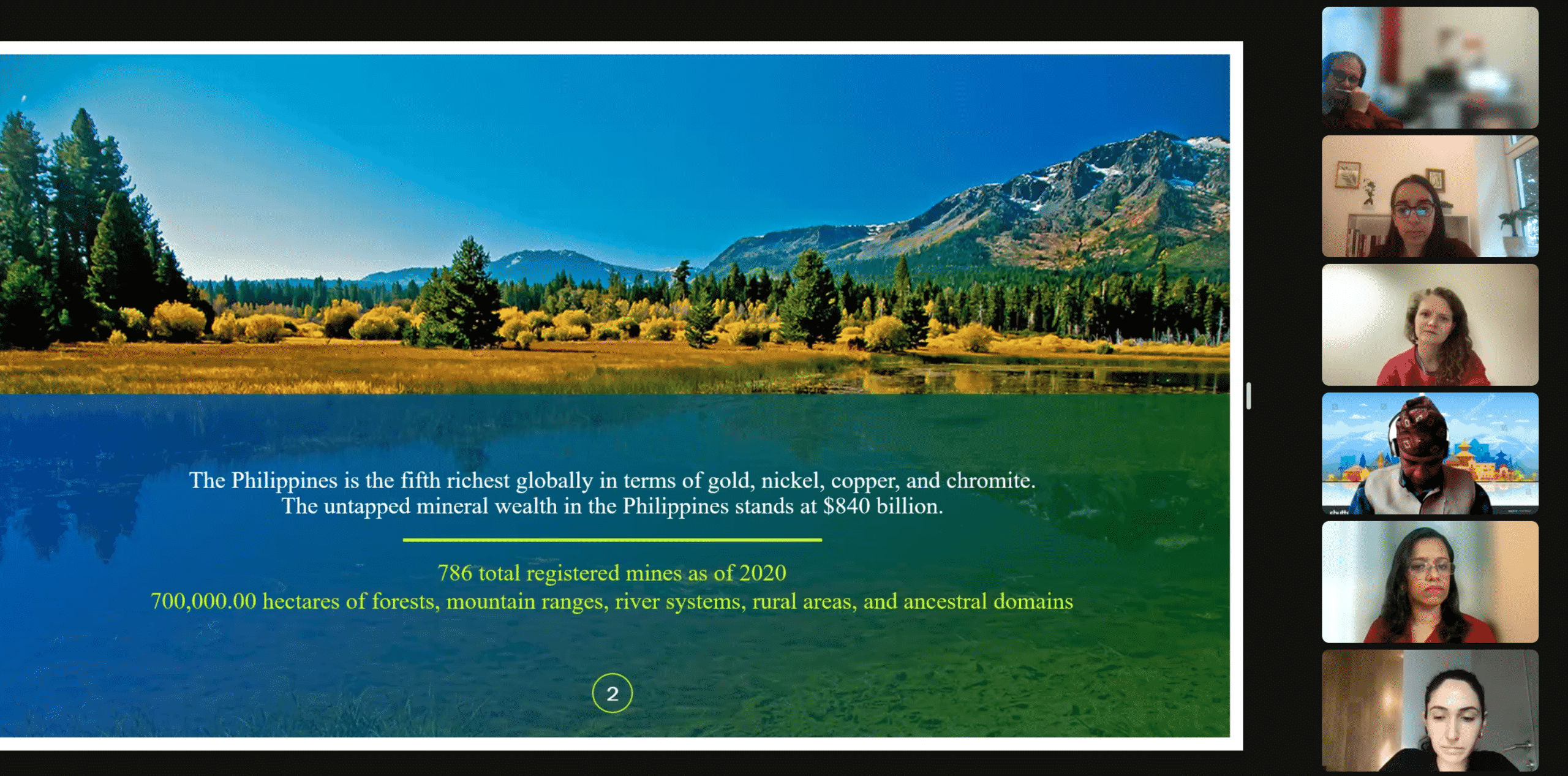
Juanita Rey Henderson, from Caritas Philippines, presented the country’s political interface, governance, corruption and its impacts on the people of Philippines. The political interface was described as very supportive of the mining industry, with a presidential decree for a modernized system of administration and disposition of mineral lands to promote and encourage development and exploitation. There are various acts that allow 100% foreign ownership and multiple tax incentives such as duty-free capital equipment imports, and VAT (value-added tax) exemptions. On the other hand, heavy support from pro-mining public officials and strong links with the mining industry allegedly compromises positions on environmental protection, management, and policy-making in the Philippines.
Moreover, there are allegations against government officials and agencies which provide permits without due process, demonstrating insufficient internal controls pertaining to mining concessions, weak enforcement to curb illegal logging, quarrying, and other extractives. The presenter also painted a detailed picture of the negative impacts on people, including the violation of land rights, illegal acquisitions of ancestral domains, farmlands, agrarian areas, the violation of labor rights, displacement of indigenous tribes, gender-based violence and environmental degradation encompassing the destruction of marine ecosystems, coral reefs, the removal of forest covers and endemic vegetation. Caritas Philippines welcomes the Rights of Nature Bill and the Alternative Minerals Management Bill, and also calls for passing bills to restore governance in the extractive industries.
Corruption Vulnerabilities in the Extractive Industries: Experiences from West Africa
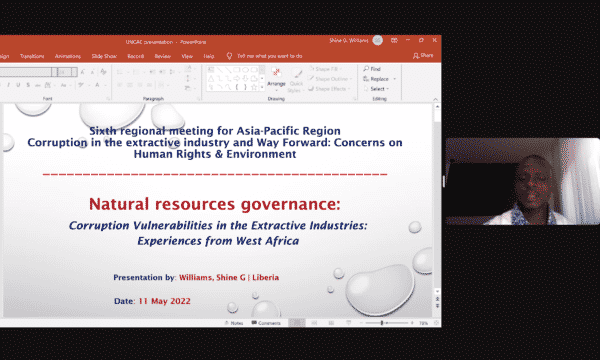
Shine Williams, an anti-corruption expert from Liberia, presented anti-corruption efforts in West African countries with cases from Liberia, Sierra Leone and Ghana. Despite having relevant legislation in all three countries, corruption is a persistent vulnerability. Inadequate monitoring of licensing, a lack of awareness and involvement of the community in the negotiation processes, and impunity among perpetrators reinforce corrupt practices. The speaker suggested addressing impunity and conflicts of interest in negotiations, raising awareness among community dwellers and strengthening the participation of civil society organizations. He also emphasized the proper enforcement of anti-corruption laws and policies to preserve the interests of affected communities.
Address Corruption in the Extractive Corporations from the ‘Headquarter Countries’
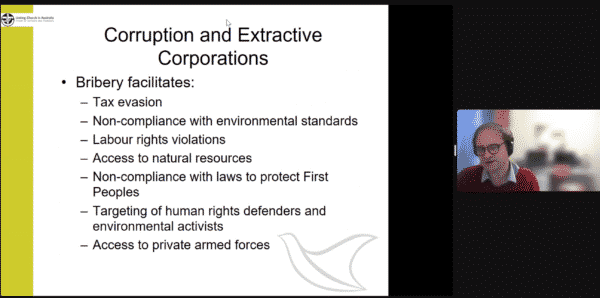
Mark Zirnsak from the Uniting Church in Australia presented the perspective of a headquarter country. He reiterated the irregularities mentioned by other speakers and suggested possible avenues for action in ‘headquarter countries’; such as assisting anti-corruption NGOs and civil society groups in the countries of implementation. Using media coverage, targeting funding bodies, initiating legal action against companies paying bribes, and legal actions on the proceeds of crime were also referred to as possible avenues for action. He presented the case of Phnom Penh Sugar in Cambodia, where there were allegations of corruption surrounding the involvement of the Australian ANZ Bank . In the end, ANZ agreed to pay the profits made off the loan back to local community members who had been affected. They also spent around a year working with non-governmental organizations in reviewing their grievance processes.
The meeting was followed by a vibrant discussion on the issue areas. There were questions about the role of the investing authority in the source country and on how CSOs in Thailand can leverage pressure on the specific company. CSOs engaged with the Coalition in both the countries are collaborating with each other to exert some pressure, hoping for positive change. In the Q&A session, it was also mentioned that civil society is working to mend the bridge between companies and the government, informing the community about their rights and also providing training on how to be proactive in the process, as well as accessing the right information.
A final takeaway from the meeting was that CSOs in different countries, including receiving and source countries in the context of extractive projects can collaborate to share information, identify channels for action points and play a vital role in combating corruption in this sector. Members from the region are invited to continue sharing information and ideas, and provide updates on their joint actions regarding these cases in forthcoming regional Asia-Pacific meetings.



